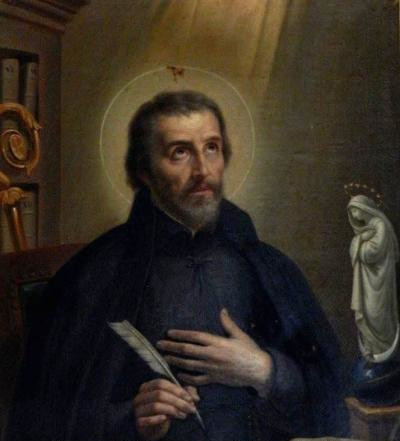
Saint of the Day December 21: St. Peter Canisius
St. Peter Canisius: Life and Legacy of the Second Apostle of Germany
Name
St. Peter Canisius
Title
Priest and Doctor of the Church
Birth
May 8, 1521, Nijmegen, Netherlands
Death
December 21, 1597, Fribourg, Switzerland
Recurrence
21 December
Beatification
1869, Rome, Pope Pius IX
Canonization
1925, Rome, Pope Pius XI
Prayer
O God, who raised up in the midst of your people Saint Peter Canisius, a priest full of charity and wisdom, to confirm the faithful in Catholic doctrine, grant to those who seek the truth, the joy of finding you and to those who believe, perseverance in the faith. Amen.
Patron Saint of
Strembo
Roman Martyrology
St. Peter Canisius, priest of the Society of Jesus and Doctor of the Church, who, sent to Germany, worked strenuously for many years in defending and strengthening the Catholic faith through preaching and his writings, including the famous Catechism. In Freiburg, Switzerland, he finally took rest from his labors.
The Saint and Mission
St. Peter Canisius, known as the Second Apostle of Germany, is a key figure in the history of the Catholic Church, particularly for his role in the Counter-Reformation. His life and ministry offer a vivid picture of how the Christian mission can be pursued through education, preaching and defense of the faith.
St. Peter Canisius’ mission was distinguished by his intellectual and pedagogical approach to the faith. As one of the earliest members of the Society of Jesus (Jesuits), he devoted himself to the instruction and education of young people in the Catholic faith. He founded colleges and universities in different parts of Europe, understanding that education was essential to strengthen and spread the Catholic faith, especially at a time when it was challenged by the Protestant Reformation.
Canisius was also a prolific preacher and writer. His homilies and works, including the famous “Catechism of Canisius,” were vital tools for reaffirming and spreading Catholic teachings. Through his writings, he sought to offer a clear and accessible explanation of Catholic doctrine, promoting a deeper understanding and more vigorous practice of the faith.
Another significant aspect of his mission was his commitment to reconciliation and dialogue. At a time marked by religious divisions and conflicts, Canisius worked to promote peace and understanding among Christians of different denominations. His ability to dialogue with respect and charity, while remaining faithful to Catholic doctrine, was exemplary.
The life and ministry of St. Peter Canisius illustrate the importance of intellectual formation, eloquent preaching and constructive dialogue in the Christian mission. His example continues to inspire the faithful to a deep commitment to education in the faith, clarity in the communication of doctrine and a compassionate approach in ecumenical dialogue.
The Saint and Mercy
St. Peter Canisius, one of the central figures of the Counter-Reformation and an influential member of the Jesuit Order, embodied mercy through his ministry and works. His life and work demonstrate how mercy can be expressed in the context of faith, education and dialogue.
St. Peter Canisius’ mercy was manifested in his dedication to the education and formation of young people in the faith. Recognizing the importance of education as a means of guiding and forming the next generation, Canisius helped found Jesuit colleges and universities. This emphasis on education was not only an act of promoting doctrine, but also an act of mercy, offering people the tools to better understand their faith and live it more fully.
Moreover, his work as a writer, particularly his “Catechism of Canisius,” was another example of his mercy in action. This work provided a clear and accessible explanation of the Catholic faith, making Christian doctrine more understandable to ordinary people. His ability to express complex theological truths in simple terms showed a deep concern for the spiritual welfare of the faithful.
Canisius also engaged in ecumenical dialogue, seeking to promote peace and reconciliation among Christians at a time of great religious divisions. His approach to dialogue was marked by charity and understanding, while remaining firmly rooted in Catholic doctrine. His search for unity in truth and mutual respect was a form of mercy, seeking to bridge divisions and heal the wounds of the Church.
The life of St. Peter Canisius teaches us that mercy can be deeply intertwined with education, preaching and dialogue. His example shows us that being instruments of mercy means not only offering material help and comfort, but also providing spiritual guidance, understanding and opportunities for growth in faith.
Hagiography
He is a worthy son of St. Ignatius of Loyola, destined by God to shine the brightest light in Germany at the time when Luther was rebelling against the Church, sowing the infernal darnel of the Protestant heresy.
Peter was born in Nijmegen in the Netherlands on May 8, 1521, to James and Egidia Houweningen, pious and noble lords. While still a child, he demonstrated his inclination for piety by imitating sacred ceremonies. Made older, his father, in order to give him a more complete education, sent him to the Catholic University of Cologne, where he progressed rapidly in his studies, but especially in the path of holiness.
There he met the man who advised him to enter the Society of Jesus, Bl. Pietro Fabro, one of its co-founders.
Much he struggled and suffered to follow his vocation, but his perseverance was crowned brilliantly. Peter was one of the first sons of St. Ignatius, but…
